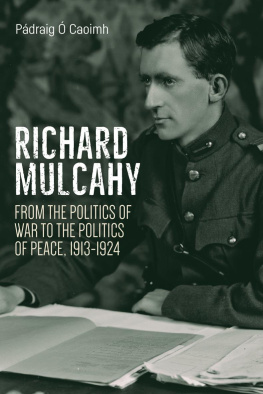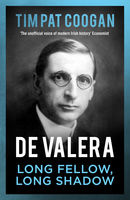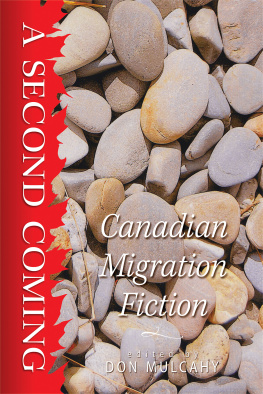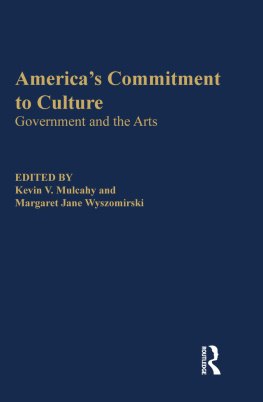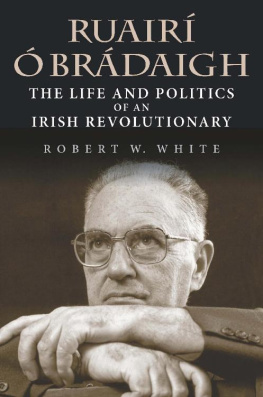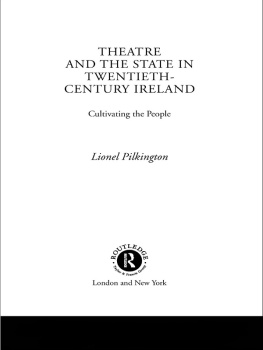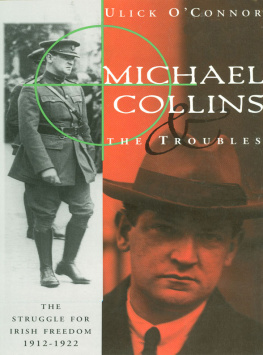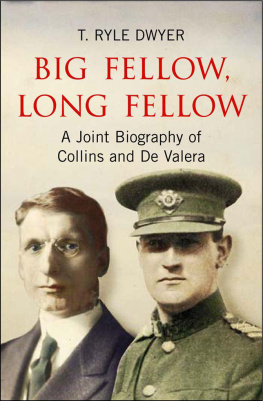First published in 2019 by
Irish Academic Press
10 Georges Street
Newbridge
Co. Kildare
Ireland
www.iap.ie
Pdraig Caoimh, 2019
9781788550987 (Cloth)
9781788550994 (Kindle)
9781788551007 (Epub)
9781788551014 (PDF)
British Library Cataloguing in Publication Data
An entry can be found on request
Library of Congress Cataloging in Publication Data
An entry can be found on request
All rights reserved. Without limiting the rights under copyright reserved alone, no part of this publication may be reproduced, stored in or introduced into a retrieval system, or transmitted, in any form or by any means (electronic, mechanical, photocopying, recording or otherwise) without the prior written permission of both the copyright owner and the above publisher of this book.
Typeset in Minion Pro 11.5/15 pt
Front jacket: Image courtesy of the National Library of Ireland, Keogh Brothers Collection, 1922.
Back jacket includes Richard Mulcahy: background (University College Dublin Archives) and foreground (National Library of Ireland).
Preface and Acknowledgments
This book is a study of two interrelated processes which transpired during the revolutionary period of Irish national liberation, 191324, namely the politicomilitary career of Richard Mulcahy and the struggle for supremacy within the nationalist elite, especially the struggle for supremacy on the vital question of the nature and extent of the emerging governmentarmy relationship.
As can be gathered, then, in trying to assay the interrelationship between a complex man and a complex topic by dint of accuracy of fact and opinion, an amount of research had to be undertaken. To that end the Mulcahy Papers, which were readied by the man himself and his family during the last ten years of his life in preparation for transfer to University College Dublins Archive Department (UCDA), and which offer an abundance of primary source material, especially on the period, 191624, were the wellspring of information for me.
Notwithstanding, there was but a relatively negligible amount of private correspondence available in UCDA. Similarly, in regards to the letters he reputedly wrote on a regular basis to Jim Kennedy, his long-term IRB friend from Thurles, a search of the extensive Brother Allan Papers in the Military Archives of Ireland (MAI), wherein merely a small number of pamphlets exists in what is termed the James Kennedy Papers, and a search of the Christian Brothers Archive turned up nothing.
Still, at UCDA, I was able to find Mulcahys thoughts in his intermittent diary-type notes, his official communications and memoranda and his memoir-type publications, as well as in the tape-recorded conversations he had during the 1960s with former comrades and with his wife, Min, and son, Risteard. I was also able to find references to him in the Cabinet minutes and state paper deposits of the National Archives of Ireland (NAI). Moreover, by means of the wide circle of family correspondences which are available in the Ryans of Tomcoole Papers, as well as in Mins own personal correspondences in the uncatalogued Min Ryan Papers in the National Library of Ireland (NLI), it became possible to hazard an intelligent guess at the nature of the mans political relationship with his wife. Equally, a wealth of atmospheric detail was gleaned from the Bureau of Military History (BMH) witness statements and from the Military Service Pensions Collection in the Military Archives of Ireland (MAI), as well as from the colourful memoirs of the likes of Barry, Deasy, Ceallaigh, OMalley and Maoilein. And the Papers of Florence ODonoghue (NLI) and Sen MacEoin (UCDA), together with Pollard, Secret Societies , and Moody/ Broin, Documents , were found to be very helpful in tracing the lineage ofMulcahys attitude to Collins IRB.
A trawl of the impressive library of modern Irish history publications was undertaken additionally. Furthermore, some classic pieces from the disciplines of political science and governmental studies, along with the small, latter-day history corpus dealing with the emergence of Irish democracy, were the better studied in order to understand Mulcahy as a soldier-politician, and to compare and contrast the Irish civilmilitary question with similar post-imperial state formative processes which were ongoing throughout Europe at the time.
Of course, on occasions, such researches can generate more perspiration than inspiration. Consequently, I am very grateful to those people who went out of their way to be of assistance to me. In that category, during the early years, I would like to list the following: Risteard Mulcahy, Richards son, who courteously expedited my researches by allowing photocopying to happen; Garret Fitzgerald who dispassionately facilitated access to Defence files; Peter Young, proto-archivist of the MAI, whose enthusiasm was infectious; anti-Treatyites, like Todd Andrews, Sen Dowling and Peadar ODonnell, who responded candidly to my questions; Mire Tobin, daughter of Liam, as well as Pdraig Thornton, son of Frank, both of whom were happy to share their opinions and provide documentation; and last, but certainly not least, Prof. J.J. Lee, whose support and advice I was fortunate to benefit from during the period, 198287, while writing the Ph. D. thesis from which this book originates.
Then, of late, in terms of the archives and libraries visited, the following professionals deserve special mention: UCDA: Orna Somerville and her assistants, Kate, Meadhbh and Sarah; NLI: Avice-Claire McGovern and Saoirse Reynolds; NAI: Louise Kennedy; MAI: Noelle Grothier; Irish Christian Brothers Archive: Michelle Cooney and Karen Johnson; Irish Capuchin Archive: Brian Kirby; UCC archives: Mary Lombard; Cork City and County Archives: Brian McGee and Tim OConnor; South Dublin Libraries: David Power; Cork County library: Kieran Ryan; Tipperary Local Studies and Archive: Jane Bulfin; Waterford City and County Archive: Joanne Rothwell; and the Postal Museum Archive, London: Barry Attoe.
And, moreover, I would like to thank Risteard Mulcahy, Richard Mulcahys grandson, who so generously offered moral support and facilitated the digital photographing of images of his grandfather. Also, I am indebted to Conor Graham, who perceived merit in my project, and his hard-working staff at Irish Academic Press, especially Fiona Dunne, the managing editor.
Ach, i ndeireadh na dla, ba mhaith liom aitheantas irithe a thabhairt do mo theaghlach, s sin do mo bhean chile, Assumpta, agus do mo bhuachaill, J.P. agus amonn, mar gheall ar an dtacaocht dhograiseach a thugadar dom n nimad a shocraigh m filleadh ar an bpeann.
Pdraig Caoimh
October 2019
INTRODUCTION
The Political Life of Richard Mulcahy,
18901959
I n a political life which spanned the spectrum of the three major political phases of late-nineteenth- and early-twentieth-century Irish history, namely the IrishIreland phase, the belligerent phase and the post-Civil War, party-political phase, Richard Mulcahys contribution to both the formative and the developmental processes of modern Irelands polity place him at the top of the countrys founding nationalist elite.
The IrishIreland Phase, 18901913
Mulcahy did not come from a radical political background, quite the opposite, in fact. His father, Patrick, a post office clerk, and conservative by nature, frowned on anything which might compromise his position in the postal service or might hinder the attainment of safe and respectable prospects for his children. Instead, it was in the strict practice of religion and learning that he, supported by his wife, Elizabeth, resided all of his hopes for his familys future.

